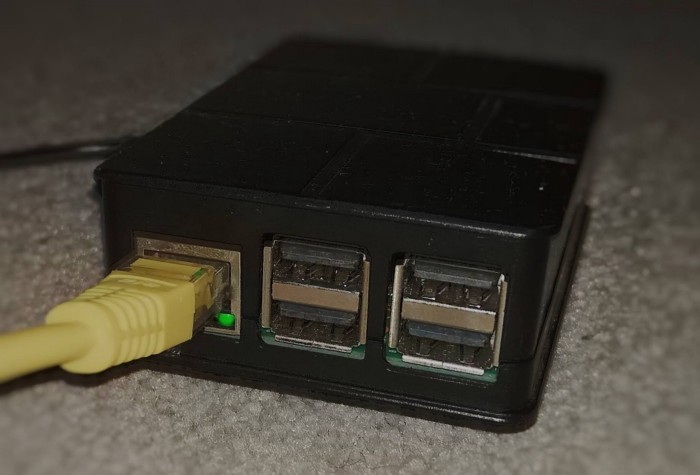
Greetings to the inhabitants of Habr!
I wondered how you can do without a static IP for experiments at home. I came across this article.
If you want to deploy your web server with external access, and you don’t want to pay the provider for a static IP, then this solution is quite an option for yourself, which can be further customized to suit your needs.
- Rasberry Pi, . - Linux IP-, apache2 Pi , . , IP ! — - IP-… ?!
Google Domains VPS/« ». IP- , (@.example.com) IP- ( http https Pi). , , IP . , , .
, Pythonpip install domains-api
IP-, , , ipify API (api.ipify.org), IP-. Python requests :
IP = requests.get('https://api.ipify.org').text
, IP. , ? IP-, , .
, ? - IP-, . . , domain.google.com, , . Python, Gmail ( (less secure apps) Google):
from email.message import EmailMessage
def send_notification(new_ip):
msg = EmailMessage()
msg.set_content(f'IP has changed!\nNew IP: {new_ip}')
msg['Subject'] = 'IP CHANGED!'
msg['From'] = GMAIL_USER
msg['To'] = GMAIL_USER
try:
server = smtplib.SMTP_SSL('smtp.gmail.com', 465)
server.ehlo()
server.login(GMAIL_USER, GMAIL_PASSWORD)
server.send_message(msg)
server.close()
log_msg = 'Email notification sent to %s' % GMAIL_USER)
logging.info(log_msg)
except (MessageError, ConnectionError) as e:
log_msg = 'Something went wrong: %s' % e
logging.warning(log_msg)
, , — Gmail , , . , , , , , base64 , : / / :
def enc_pwd():
pwd = base64.b64encode(getpass("What's your email password?: ").encode("utf-8"))
with open('cred.txt', 'wb') as f:
f.write(pwd)
def read_pwd():
if os.path.isfile(f"{CWD}/cred.txt"):
with open(f'{CWD}/cred.txt', 'r') as f:
if f.read():
password = base64.b64decode(pwd).decode('utf-8')
logging.info('Password read successfully')
return password
else:
enc_pwd()
read_pwd()
else:
enc_pwd()
read_pwd()
GMAIL_PASSWORD read_pwd() ( ), .
, , , — , / IP-:
def check_ip():
if os.path.isfile('ip.txt'):
# IP
with open('ip.txt', 'r') as rf:
line = rf.readlines()
if not line:
first_run = True
elif line[0] == IP:
first_run = False
change = False
else:
first_run = False
change = True
else:
first_run = True
if first_run or change:
# IP
with open('ip.txt', 'w') as wf:
if first_run:
wf.write(IP)
elif change:
wf.write(IP)
# :
send_notification(IP)
time.sleep(21600) # - 6- crontab . , crontab - '/'.
check_ip()
! . , domains.google.com…
, ? ? , !
, , — , , , ! , , : - Selenium -? , Google , , IP. :
, Google Domains ( Google, Gmail) - Selenium. ( ) Stack Overflow, Stack Overflow Google, Google, , . , , — , Captcha StackOverflow, , , - , -! - PyVirtualDisplay Geckodriver (- Firefox), « », - Captcha.
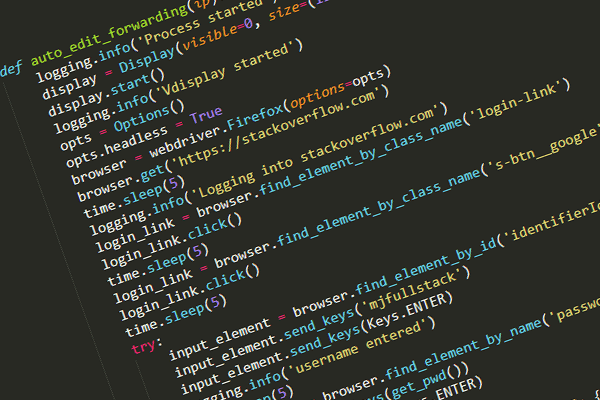
, / , , , , , — , , . , .
, Google Domains API , . APi, , , , API DNS — , DNS « » ( , - bash, !)
«Synthetic records» DNS Google Domains :
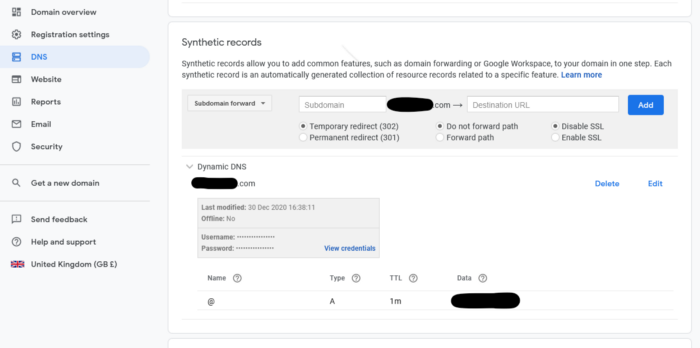
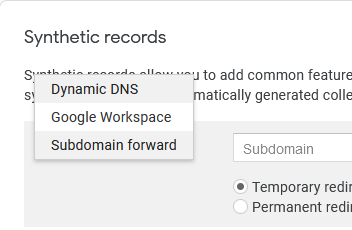
, API:
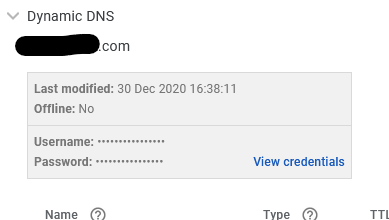
, , ! TTL DNS , : 1 , — . , , API check_ip(), ! (2 ) :
req = requests.post(f'https://<auto_generated_username>:<auto_generated_password>@domains.google.com/nic/update?hostname=@.example.com&myip={IP}')
logging.info(req.content)
try / except, , , . crontab - , () IP!
! …
, , ! , , - , , User
IpChanger
. User
smtp API domains.google, previous_ip
, , pickle ( JavaScript); User()
pickle, . User
, API. IpChanger
User()
, , , IpChanger()
; ! , /, / , ip.txt
, .
The finished, almost unique (!) Result can be seen below in its entirety, and it can also be forked / cloned from my GitHub (including README.md with installation instructions). I've also released it as a Python package at pypi.org, which you can view here or install in the usual way with:pip install domains-api
Any questions, feedback or suggestions - write!
What other methods of stable operation of a web server without a static address do you know? And how can this solution be finalized?
import os
import sys
import getopt
import base64
import smtplib
from email.message import EmailMessage
from getpass import getpass
from itertools import cycle
from requests import get, post
from requests.exceptions import ConnectionError as ReqConError
from domains_api.file_handlers import FileHandlers
fh = FileHandlers()
def get_ip_only():
"""Gets current external IP from ipify.org"""
current_ip = get('https://api.ipify.org').text
return current_ip
class User:
BASE_URL = '@domains.google.com/nic/update?hostname='
def __init__(self):
"""Create user instance and save it for future changes to API and for email notifications."""
self.domain, self.dns_username, self.dns_password, self.req_url = self.set_credentials()
self.notifications, self.gmail_address, self.gmail_password = self.set_email()
self.outbox = []
def set_credentials(self):
"""Set/return attributes for Google Domains credentials"""
self.domain = input("What's your domain? (example.com / subdomain.example.com): ")
self.dns_username = input("What's your autogenerated dns username?: ")
self.dns_password = getpass("What's your autogenerated dns password?: ")
self.req_url = f'https://{self.dns_username}:{self.dns_password}{self.BASE_URL}{self.domain}'
return self.domain, self.dns_username, self.dns_password, self.req_url
def set_email(self):
"""Set/return attributes for Gmail credentials if user enables notifications"""
self.notifications = input("Enable email notifications? [Y]all(default); [e]errors only; [n]no: ").lower()
if self.notifications != 'n':
self.gmail_address = input("What's your email address?: ")
self.gmail_password = base64.b64encode(getpass("What's your email password?: ").encode("utf-8"))
if self.notifications != 'e':
self.notifications = 'Y'
return self.notifications, self.gmail_address, self.gmail_password
else:
return 'n', None, None
def send_notification(self, ip=None, msg_type='success', error=None, outbox_msg=None):
"""Notify user via email if IP change is made successfully or if API call fails."""
if self.notifications != 'n':
msg = EmailMessage()
msg['From'] = self.gmail_address
msg['To'] = self.gmail_address
if ip and msg_type == 'success' and self.notifications not in {'n', 'e'}:
msg.set_content(f'IP for {self.domain} has changed! New IP: {ip}')
msg['Subject'] = 'IP CHANGED!'
elif msg_type == 'error' and self.notifications != 'n':
msg.set_content(f"Error with {self.domain}'s IPChanger: ({error})!")
msg['Subject'] = 'IPCHANGER ERROR!'
elif outbox_msg:
msg = outbox_msg
try:
server = smtplib.SMTP_SSL('smtp.gmail.com', 465)
server.ehlo()
server.login(self.gmail_address, base64.b64decode(self.gmail_password).decode('utf-8'))
server.send_message(msg)
server.close()
return True
except Exception as e:
log_msg = 'Email notification not sent: %s' % e
fh.log(log_msg, 'warning')
self.outbox.append(msg)
fh.save_user(self)
sys.exit(1)
class IPChanger:
ARG_STRING = 'cdehinu:'
ARG_LIST = ['credentials',
'delete_user',
'email',
'help',
'ip',
'notifications',
'user_load=']
def __init__(self, argv=None):
"""Check for command line arguments, load/create User instance,
check previous IP address against current external IP, and change via the API if different."""
# Load old user, or create new one:
if os.path.isfile(fh.user_file):
self.user = fh.load_user(fh.user_file)
fh.log('User loaded from pickle', 'debug')
else:
self.user = User()
fh.log('New user created.\n(See `python -m domains_api --help` for help changing/removing the user)', 'info')
self.current_ip = self.get_set_ip()
# Parse command line options:
try:
opts, _args = getopt.getopt(argv, self.ARG_STRING, self.ARG_LIST)
except getopt.GetoptError:
print('''Usage:
python/python3 -m domains_api --help''')
sys.exit(2)
if opts:
self.arg_parse(opts)
# Check IPs:
try:
if self.user.previous_ip == self.current_ip:
log_msg = 'Current IP: %s (no change)' % self.user.previous_ip
else:
self.user.previous_ip = self.current_ip
fh.save_user(self.user)
self.domains_api_call()
log_msg = 'Newly recorded IP: %s' % self.user.previous_ip
fh.log(log_msg, 'info')
except AttributeError:
setattr(self.user, 'previous_ip', self.current_ip)
fh.save_user(self.user)
self.domains_api_call()
finally:
if fh.op_sys == 'pos' and os.geteuid() == 0:
fh.set_permissions(fh.user_file)
# Send outbox emails:
if self.user.outbox:
for i in range(len(self.user.outbox)):
self.user.send_notification(outbox_msg=self.user.outbox.pop(i))
fh.log('Outbox message sent', 'info')
fh.save_user(self.user)
fh.clear_logs()
def get_set_ip(self):
"""Gets current external IP from api.ipify.org and sets self.current_ip"""
try:
return get_ip_only()
except (ReqConError, ConnectionError) as e:
fh.log('Connection Error. Could not reach api.ipify.org', 'warning')
self.user.send_notification(msg_type='error', error=e)
def domains_api_call(self):
"""Attempt to change the Dynamic DNS rules via the Google Domains API and handle response codes"""
try:
req = post(f'{self.user.req_url}&myip={self.current_ip}')
response = req.text
log_msg = 'Google Domains API response: %s' % response
fh.log(log_msg, 'info')
# Successful request:
_response = response.split(' ')
if 'good' in _response or 'nochg' in _response:
self.user.send_notification(self.current_ip)
# Unsuccessful requests:
elif response in {'nohost', 'notfqdn'}:
msg = "The hostname does not exist, is not a fully qualified domain" \
" or does not have Dynamic DNS enabled. The script will not be " \
"able to run until you fix this. See https://support.google.com/domains/answer/6147083?hl=en-CA" \
" for API documentation"
fh.log(msg, 'warning')
if input("Recreate the API profile? (Y/n):").lower() != 'n':
self.user.set_credentials()
self.domains_api_call()
else:
self.user.send_notification(self.current_ip, 'error', msg)
else:
fh.log("Could not authenticate with these credentials", 'warning')
if input("Recreate the API profile? (Y/n):").lower() != 'n':
self.user.set_credentials()
self.domains_api_call()
else:
fh.delete_user()
fh.log('API authentication failed, user profile deleted', 'warning')
sys.exit(1)
# Local connection related errors
except (ConnectionError, ReqConError) as e:
log_msg = 'Connection Error: %s' % e
fh.log(log_msg, 'warning')
self.user.send_notification(msg_type='error', error=e)
def arg_parse(self, opts):
"""Parses command line options: e.g. "python -m domains_api --help" """
for opt, arg in opts:
if opt in {'-i', '--ip'}:
print('''
[Domains API] Current external IP: %s
''' % get_ip_only())
elif opt in {'-h', '--help'}:
print(
"""
domains-api help manual (command line options):
You will need your autogenerated Dynamic DNS keys from https://domains.google.com/registrar/example.com/dns to create a user profile. python -m domains_api || -run the script normally without arguments python -m domains_api -h --help || -show this help manual python -m domains_api -i --ip || -show current external IP address python -m domains_api -c --credentials || -change API credentials python -m domains_api -e --email || -email set up wizard > use to delete email credentials (choose 'n') python -m domains_api -n --notifications || -toggle email notification settings > will not delete email address python -m domains_api -u user.file || (or "--user_load path/to/user.file") -load user from pickle file python -m domains_api -d --delete_user || -delete current user profile || User files are stored in "/var/www/domains_api/domains.user" """ ) elif opt in {'-c', '--credentials'}: self.user.set_credentials(update=True) self.domains_api_call() fh.save_user(self.user) fh.log('API credentials changed', 'info') elif opt in {'-d', '--delete'}: fh.delete_user() fh.log('User deleted', 'info') print('>>>Run the script without options to create a new user, or ' '"python3 -m domains_api -u path/to/pickle" to load one from file') elif opt in {'-e', '--email'}: self.user.set_email() fh.save_user(self.user) fh.log('Notification settings changed', 'info') elif opt in {'-n', '--notifications'}: n_options = {'Y': '[all changes]', 'e': '[errors only]', 'n': '[none]'} options_iter = cycle(n_options.keys()) for option in options_iter: if self.user.notifications == option: break self.user.notifications = next(options_iter) fh.save_user(self.user) log_msg = 'Notification settings changed to %s' % n_options[self.user.notifications] fh.log(log_msg, 'info') if self.user.notifications in {'Y', 'e'} and not self.user.gmail_address: fh.log('No email user set, running email set up wizard...', 'info') self.user.set_email() fh.save_user(self.user) elif opt in {'-u', '--user_load'}: try: self.user = fh.load_user(arg) fh.save_user(self.user) fh.log('User loaded', 'info') except FileNotFoundError as e: fh.log(e, 'warning') sys.exit(2) sys.exit()
if name == "main":
IPChanger(sys.argv[1:])
<!--</spoiler>-->